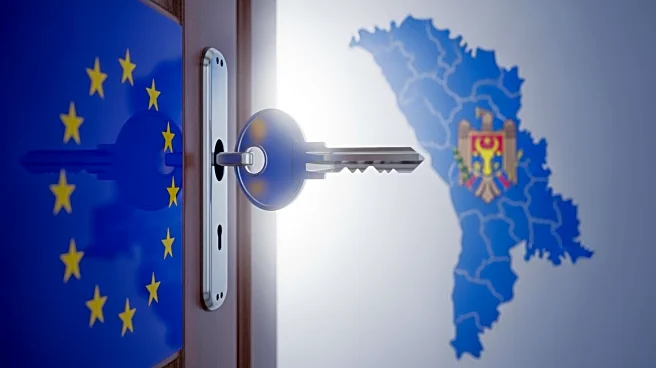What's Happening?
Moldova is advancing its integration into the European Union with significant support from the EU, following the pro-EU ruling party PAS's victory in the September 2025 parliamentary elections. The EU has
committed to aiding Moldova through various initiatives, including energy security enhancements, economic development, and countering disinformation. The EU's support includes a Comprehensive Strategy for Energy Independence and Resilience, with a budget of up to EUR 250 million in 2025, aimed at helping Moldova transition to renewable energy and improve energy efficiency. Additionally, Moldova is set to join the EU Roaming area by January 2026, allowing citizens to use mobile services across EU member states without incurring roaming fees. The EU is also facilitating Moldova's participation in several EU programs, such as Horizon Europe and the Single Market programme, to bolster its administrative capacity and economic connectivity.
Why It's Important?
Moldova's integration into the EU is a significant geopolitical development, reflecting the EU's strategic interest in stabilizing and supporting Eastern European countries amid regional tensions, particularly with Russia. The EU's comprehensive support package aims to strengthen Moldova's resilience against external pressures, including energy dependency and disinformation campaigns. This integration effort is crucial for Moldova's socio-economic development, offering access to EU markets and programs that can drive growth and modernization. The EU's backing also underscores its commitment to expanding its influence and fostering democratic governance in Eastern Europe, potentially reducing Russian influence in the region.
What's Next?
Moldova's path to EU integration will involve continued reforms and alignment with EU standards, particularly in energy, security, and economic sectors. The EU's ongoing support will be contingent on Moldova's progress in these areas. As Moldova prepares to join the EU Roaming area and further integrate into EU economic structures, it will likely face challenges in implementing necessary reforms and managing external pressures. The EU and Moldova will continue to collaborate on strategic initiatives, with potential adjustments to trade agreements and further integration into EU programs anticipated.
Beyond the Headlines
The EU's support for Moldova highlights broader geopolitical dynamics, as the EU seeks to counter Russian influence in Eastern Europe. Moldova's integration efforts may serve as a model for other countries in the region aspiring to join the EU. The focus on energy independence and resilience is particularly significant, as it addresses both economic and security concerns, reducing Moldova's vulnerability to external energy supply disruptions. The EU's initiatives also emphasize the importance of combating disinformation and enhancing strategic communication, reflecting a growing recognition of hybrid threats in the region.









